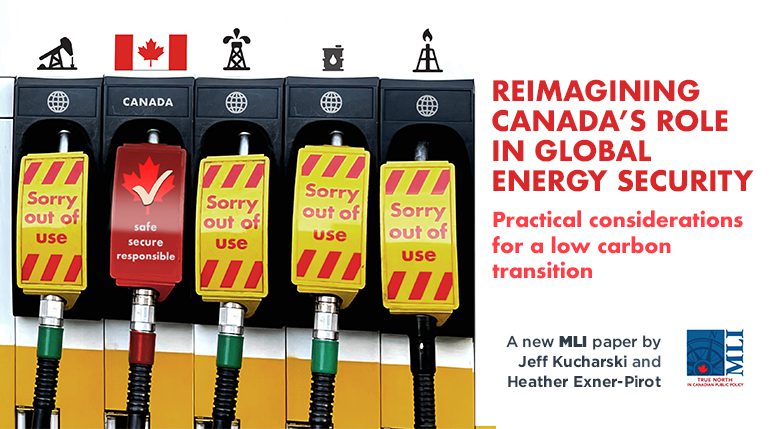OTTAWA, ON (March 21, 2022): While Canadian commuters, transit operators and shipping companies wince under soaring fuel costs, Vladimir Putin’s invasion of Ukraine has triggered an energy crunch that will inflict far more pain on EU countries who had relied so heavily on Russian gas exports. As their reserves dwindle, many will look to resource-rich Canada to fill the void.
However, despite having some of the world’s largest deposits of fossil fuels, Canada’s ability to emerge as a global energy provider is restricted by its limited production and distribution capacity across a number of key systems – refineries, mines, pipelines, and shipping terminals.
A new MLI paper, titled “Reimagining Canada’s role in global energy security: Practical considerations for a low carbon transition,” examines how Canadian energy policy in recent years has had an unbalanced focus on reducing carbon emissions and committing to still-evolving renewable energy technologies, while discouraging investment in mineral exploration and the production of conventional energy resources that are necessary for an energy transition.
This fixation is borne out of a flawed assumption that countries will be able to transition away from fossil fuels in a relatively few years, as opposed to numerous decades.
According to authors Jeff Kucharski and Heather Exner-Pirot, developed countries must have energy policies that go beyond a fixation on solving climate change to also consider energy security, which plays a direct role in protecting international stability. “We ignore an energy crisis in favour of the climate crisis at our peril.”
Yet, thanks to the narrow priorities of Canadian policy-makers, we now find ourselves compromised in terms of protecting our energy security as well as supporting allies during a time of global geopolitical upheaval.
“As the holder of the some of the world’s largest reserves of oil and gas, along with world class deposits of many critical minerals needed for the energy transition, Canada is well-positioned to meet the energy needs of our allies and partners,” write the authors.
“If Canada does not act to export its resources to hungry markets abroad, it will be ceding those opportunities to countries like Russia, Venezuela, and those in the Middle East, which will use their greater market share and leverage over global energy supplies to gain economic and political leverage.”
The authors argue that a responsible plan for energy transition is crucial for any national energy policy. Indeed, politicians and bureaucrats should work with, rather than against, the oil and gas industry through the transition, taking advantage of their knowledge and experience in the process.
“Stable, secure and affordable energy supplies are vital to human well-being and economic development,” conclude Kucharski and Exner-Pirot. “Canada has the capacity to play a role in ensuring the energy transition occurs in a way that does not create unnecessary economic hardship, foment inequality and civil unrest, or threaten global energy security.”
To read the full paper, click the button below.

***
Jeff Kucharski is a Senior Fellow at the Macdonald-Laurier Institute and an adjunct professor at Royal Roads University.
Heather Exner-Pirot is a Senior Policy Analyst and Research Coordinator of the Indigenous Policy Program at the Macdonald-Laurier Institute.
For more information, media are invited to contact:
Brett Byers
Communications and Digital Media Manager
613-482-8327 x105
brett.byers@macdonaldlaurier.ca






